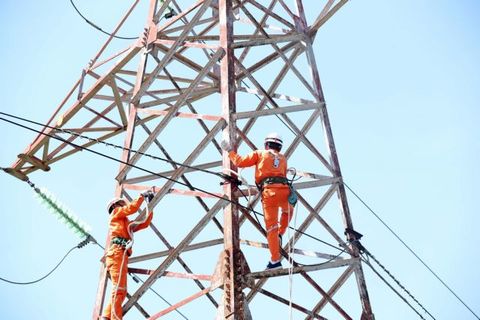
EVN workers check the 110kV transmission line. — VNA/VNS Photo Huy Hùng
High input prices were a major contributor to Vietnam Electricity (EVN)'s financial loss, according to the Department of Electricity Regulatory under the Ministry of Industry and Trade (MoIT).
Earlier, a representative from EVN said the company, Việt Nam's largest power company and sole distributor, had incurred over VNĐ28.7 trillion (US$1.18 billion) in losses during the first eight months of 2023. Last year, EVN also reported a loss of VNĐ26.5 trillion.
The company said its inability to stem the bleeding was because it had been operating below cost as prices for raw materials and input had increased significantly since the beginning of the year.
To balance the finances for EVN, a representative of the department said it was necessary to reduce fuel prices, promote energy-efficient practices, and adjust prices to offset the costs that had not been fully accounted for in the electricity prices.
Trần Việt Hòa, head of the department, said fuel price dynamics for electricity production had been, and would likely remain, unfavourable for the immediate future as they had been observed to stay on higher levels compared to previous years.
For example, the average price for imported coal in the first six months this year was $210 per tonne, while lower than 2022's figure for the same period, was still substantially higher than the 2019-21 period at $120 per tonne.
Average High-sulfur fuel oil (HSFO) prices were $423 per tonne during the period, significantly higher than the 2019-21 average at $80 per tonne.
"We anticipate high prices to affect electricity generating costs at least for the rest of 2023. In addition, higher demand, hotter weather and lower-than-expected output from hydropower plants have forced the system to max out its thermal power capacity," he said.
In addition, it doesn't look like EVN can rely on domestic suppliers for input. The last few years have seen coal production by the Vietnam National Coal - Mineral Industries Group (TKV) and the Northeast Corporation facing numerous difficulties. EVN has since been using a mix of domestic and imported coal for electricity production.
Hòa said imported coal currently accounts for about 40-60 per cent of the system's supply and therefore, will fluctuate according to global prices.
He advised EVN to quickly roll out solutions to improve efficiency and raise awareness among consumers on energy-saving practices.
"These, however, are stop-gap measures. In order to balance the books, EVN must find a way to reduce its input costs, including and especially fuel prices, and increase energy efficiency. The government should also consider allowing price adjustments to help EVN recover some of its losses.", he said.
Trần Đình Thiên, former head of the Vietnam Institute of Economics, said it's about time electricity prices started a transition to a more market-oriented model, which will allow companies to operate more effectively.
Industry experts and insiders have long voiced their concerns over how current electricity prices do not keep up with the market while largely failing to reflect input cost, which likely will cause stability issues for the entire system in the medium and long term. — VNS